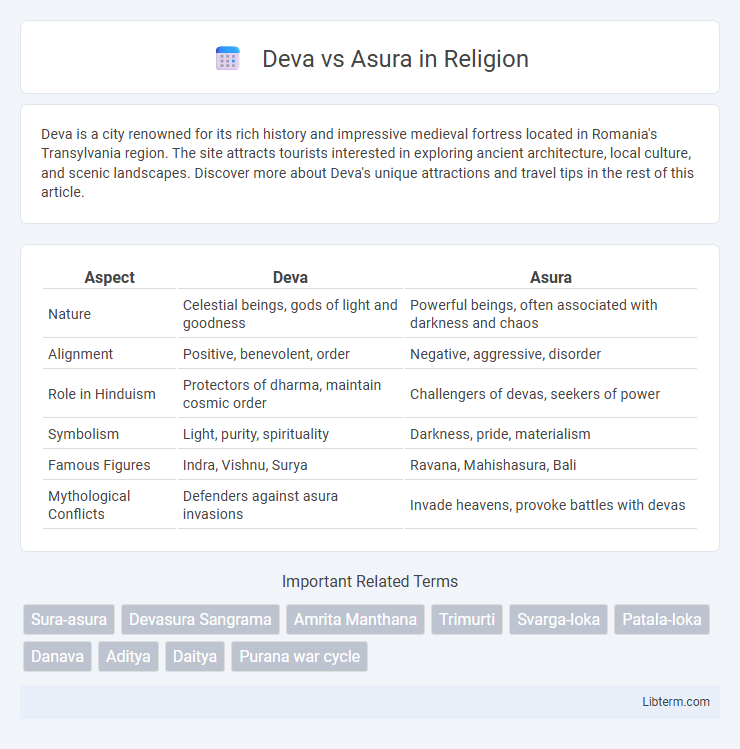Deva is a city renowned for its rich history and impressive medieval fortress located in Romania's Transylvania region. The site attracts tourists interested in exploring ancient architecture, local culture, and scenic landscapes. Discover more about Deva's unique attractions and travel tips in the rest of this article.
Table of Comparison
| Aspect | Deva | Asura |
|---|---|---|
| Nature | Celestial beings, gods of light and goodness | Powerful beings, often associated with darkness and chaos |
| Alignment | Positive, benevolent, order | Negative, aggressive, disorder |
| Role in Hinduism | Protectors of dharma, maintain cosmic order | Challengers of devas, seekers of power |
| Symbolism | Light, purity, spirituality | Darkness, pride, materialism |
| Famous Figures | Indra, Vishnu, Surya | Ravana, Mahishasura, Bali |
| Mythological Conflicts | Defenders against asura invasions | Invade heavens, provoke battles with devas |
Introduction to Deva and Asura
Devas and Asuras are prominent beings in Hindu cosmology, often representing the forces of good and evil, respectively. Devas, associated with light, order, and benevolence, are celestial beings who maintain cosmic harmony and support dharma. Asuras, in contrast, symbolize chaos and ambition, frequently opposing the Devas in their quest for power and dominance.
Origins and Mythological Background
Devas and Asuras originate from ancient Vedic mythology, representing opposing divine and demonic forces respectively. Devas are often depicted as benevolent celestial beings associated with light, order, and righteousness, while Asuras embody chaos, darkness, and power struggles. Their mythological background is deeply rooted in the cosmic battles for control over the universe, symbolizing the eternal conflict between good and evil in Hindu cosmology.
Key Differences Between Deva and Asura
Devas and Asuras are opposing supernatural beings in Hindu mythology, where Devas are gods associated with light, order, and virtue, while Asuras are often portrayed as demons linked to darkness, chaos, and power. Devas inhabit celestial realms such as Svarga, symbolizing benevolence and cosmic stability, whereas Asuras dwell in lower realms, embodying ambition, conflict, and moral ambiguity. The fundamental difference lies in their alignment with dharma (righteousness) for Devas, contrasted with Asuras' frequent defiance of divine laws and pursuit of material gain.
Powers and Abilities of Deva and Asura
Devas possess divine powers including control over natural elements, celestial energy manipulation, and advanced spiritual abilities such as healing and foresight. Asuras are known for their immense strength, mastery of dark magic, and shape-shifting capabilities, often utilizing destructive forces and illusion-based powers. Both Devas and Asuras harness supernatural abilities, with Devas focusing on benevolent and protective skills, while Asuras emphasize aggression and chaos-driven powers.
Symbolism and Representation in Hinduism
Devas symbolize cosmic order, purity, and divine forces promoting dharma, often depicted as radiant beings wielding celestial weapons in Hindu iconography. Asuras represent chaos, material desire, and ego, embodying the darker aspects of existence that challenge divine order and moral principles. Their eternal conflict illustrates the balance between good and evil, spiritual enlightenment and temptation, emphasizing the dynamic duality underlying the cosmos in Hindu philosophy.
Major Stories Featuring Deva and Asura
Major stories featuring Devas and Asuras include the churning of the ocean of milk (Samudra Manthan), where both groups collaborate to obtain Amrita, the nectar of immortality, highlighting their complex relationship of rivalry and cooperation. In the battle of Kurukshetra from the Mahabharata, Devas often support the Pandavas while Asuras align with the Kauravas, symbolizing the cosmic struggle between good and evil forces. The story of Hiranyakashipu and Prahlada further exemplifies the conflict, where the Asura king Hiranyakashipu opposes his devotee son Prahlada, who is protected by the deity Vishnu, representing the triumph of divine order over demonic chaos.
Philosophical Significance of the Deva-Asura Conflict
The Deva-Asura conflict symbolizes the eternal struggle between moral order and chaos, representing the duality within human nature and the cosmos. Philosophically, it underscores the balance between virtues such as righteousness, wisdom, and compassion embodied by the Devas, against the ego-driven desires and ignorance symbolized by the Asuras. This dichotomy encourages self-reflection and spiritual growth, emphasizing that overcoming inner Asura tendencies leads to higher consciousness and harmony in life.
Deva and Asura in Popular Culture
Deva and Asura, originating from ancient Hindu and Buddhist mythologies, frequently appear in popular culture as symbolic representations of good versus evil or order versus chaos. Devas are often depicted as benevolent celestial beings embodying light, wisdom, and guardian roles, whereas Asuras are portrayed as powerful, rebellious demons or anti-gods challenging divine authority. This duality influences numerous films, video games, anime, and literature, where their mythological narratives are adapted to explore themes of morality, conflict, and redemption.
References in Other Ancient Traditions
The Deva and Asura, originating in Vedic texts, have parallels in other ancient Indo-European traditions, where they symbolize cosmic dualities of good and evil or order and chaos. In Zoroastrianism, the Ahuras represent benevolent deities aligned with truth, contrasting with the Angra Mainyu demons, similar to the tension between Devas and Asuras in Hinduism. Comparative mythology also links the Deva-Asura conflict to Greek myths of Titans versus Olympian gods, highlighting a widespread motif of divine battles in ancient cultures.
Conclusion: Legacy of Deva and Asura
The legacy of Deva and Asura embodies the eternal struggle between divine order and chaotic ambition in Hindu mythology, symbolizing the duality inherent in cosmic balance. Devas represent righteousness, protection, and prosperity, often associated with light and goodness, while Asuras embody power, desire, and disruption, signifying darkness and challenge. This mythological dichotomy continues to influence cultural narratives, spiritual teachings, and moral frameworks across South Asian traditions, emphasizing the importance of harmony between opposing forces.
Deva Infographic

 libterm.com
libterm.com